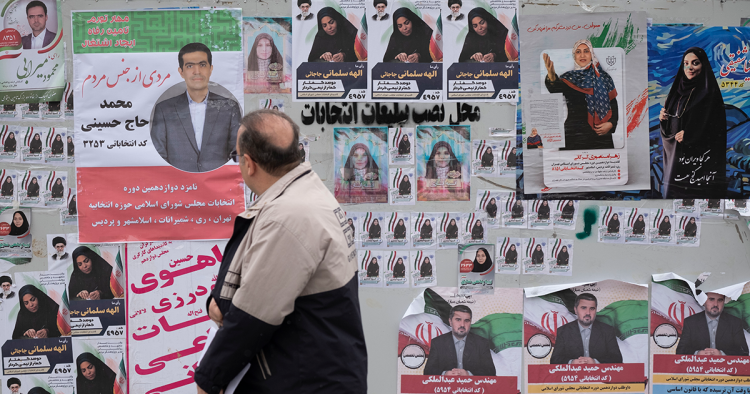The latest survey from Stasis Consulting predicts a record low turnout among Iranians in the March 1 parliamentary election of 34%. According to this survey, the majority of Iranians disapprove of President Ebrahim Raisi’s job performance as well as that of the parliament (65% and 61%, respectively). Moreover, in a hypothetical presidential face-off between President Raisi and former Foreign Minister Javad Zarif, Mr. Raisi wins out over Mr. Zarif 30% to 16%. This information is based on a representative poll conducted by Stasis Consulting between Feb. 5 and Feb. 14, 2024.
Parliamentary election turnout estimated at 34%
According to Stasis’ likely voters model, only 34% of the electorate is likely to vote in the upcoming parliamentary election on March 1 — a record low and around 9% less than the turnout in the previous parliamentary election in 2020.
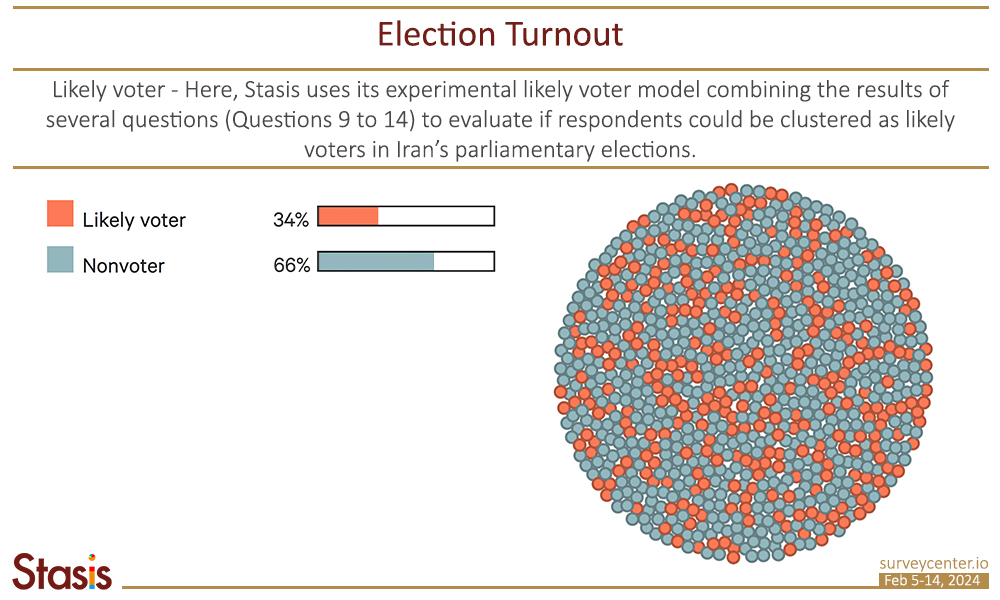
In this election, there is a significant disparity between the rates of likely voter participation based on two key demographic variables: age and education. Just 19% of Iranian youth (aged 18-29) are highly likely to vote.
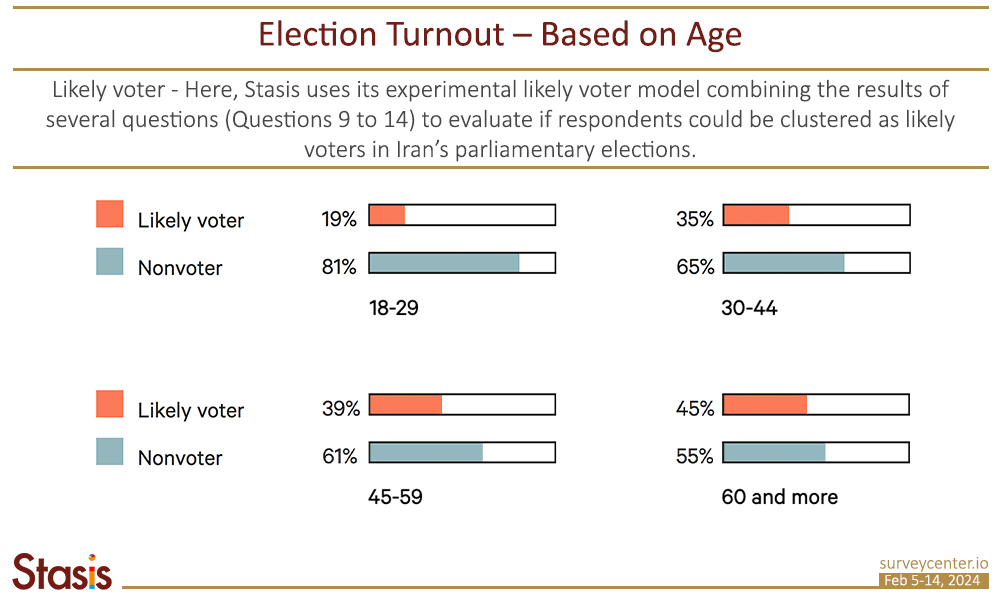
For the first time, expected voter turnout is predicted to be lower among less-educated Iranians compared to their more highly educated counterparts.
One of the most surprising findings among the survey results is that respondents without a college education say they are less likely to participate in the election (31%) than those with a college degree (40%). Historically, Stasis polling has tracked the opposite relationship between education level and voter participation rates, meaning that respondents who had earned a college degree have been less likely to vote than those who have not.
There may be several different reasons for the low turnout this election cycle, including the “Woman, Life, Freedom” movement in 2022 or the uprisings in 2017 and 2019, all of which involved many marginalized citizens, including those without access to college education. However, determining the exact causes of this trend is beyond the scope of this survey.
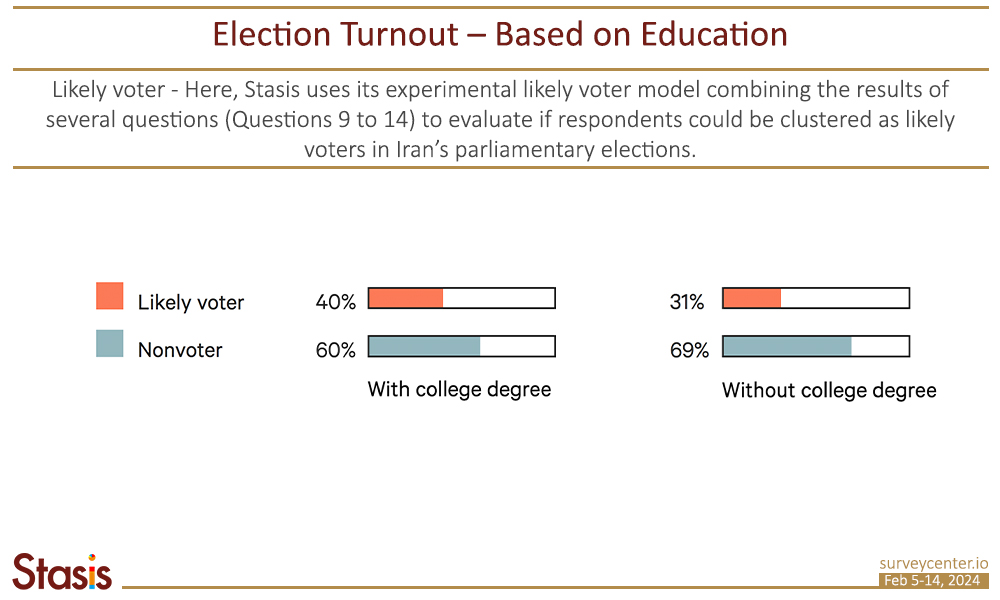
Lack of faith in candidates and the government are among the main reasons listed by those who do not plan to participate in the upcoming election.
The survey also tracks the main reasons that respondents may decline to participate in the election via an open-ended question. Among those respondents who reported they are not very confident that they will vote (n=683), 20% said it was because they don’t trust the candidates, 17% said it was because they don’t trust the government, and the same number claimed it was because they believe their votes or parliament’s decisions simply don’t matter.
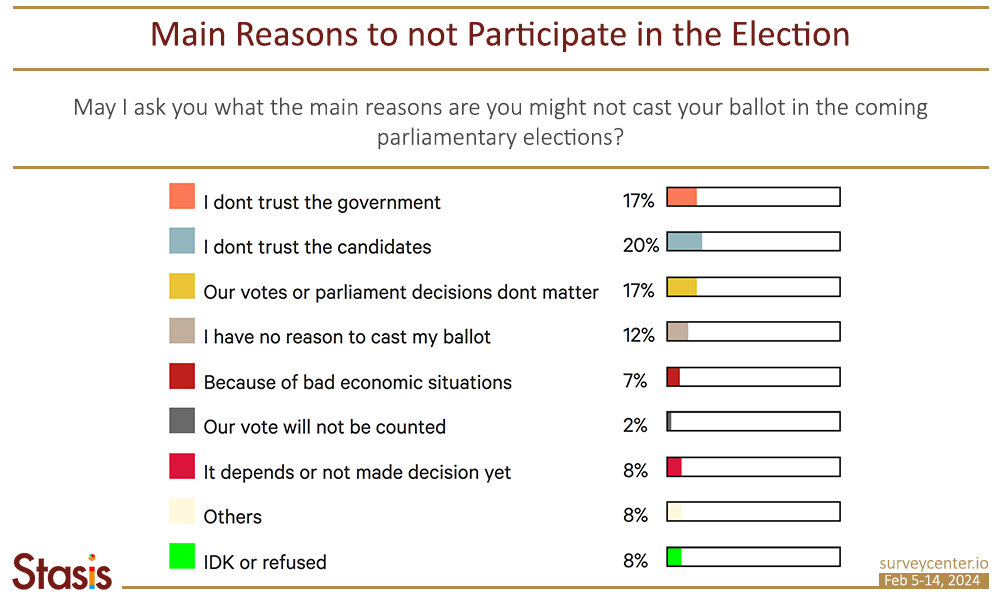
Presidential job approval is low at 32%
The results of this poll also indicate an overall disapproval of Mr. Raisi in his third year in office as president of the Islamic Republic. Only 32% of Iranians approve of his job performance while 65% disapprove of it, which includes 49% who strongly disapprove of his job performance. Although Mr. Raisi’s presidential job approval is low, this represents a 4-point improvement over Stasis’ 2022 findings.
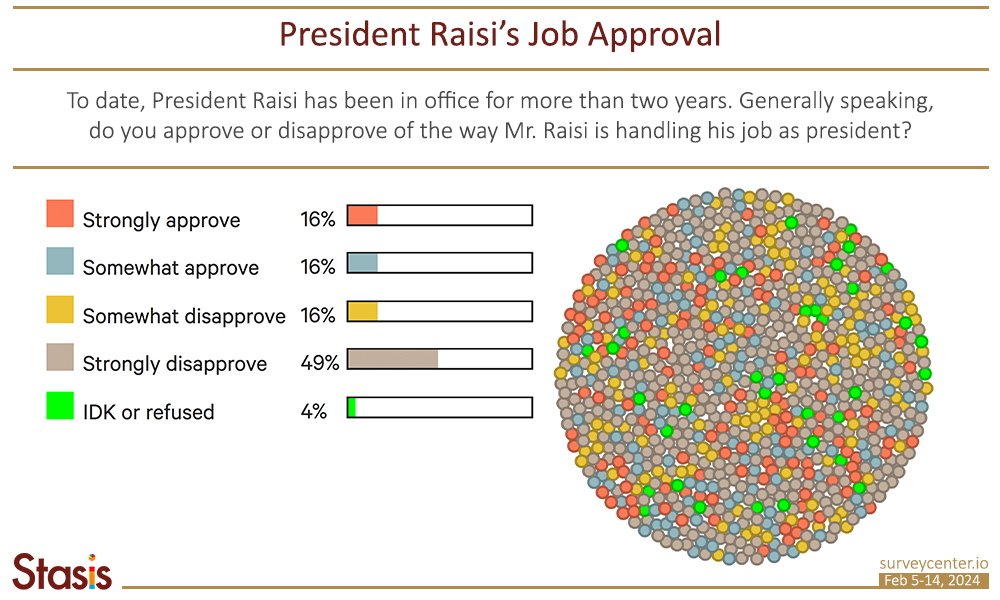
The president’s job approval rating varies somewhat across age demographics. Younger Iranians were more likely to say that they disapprove of President Raisi’s performance than older generations. Only 24% of Iranians aged 18- 29 approve of his job performance as opposed to 34% among those aged 30+. Disapproval of President Raisi’s job performance among Iranian youth is 73%, higher than for any other age group.
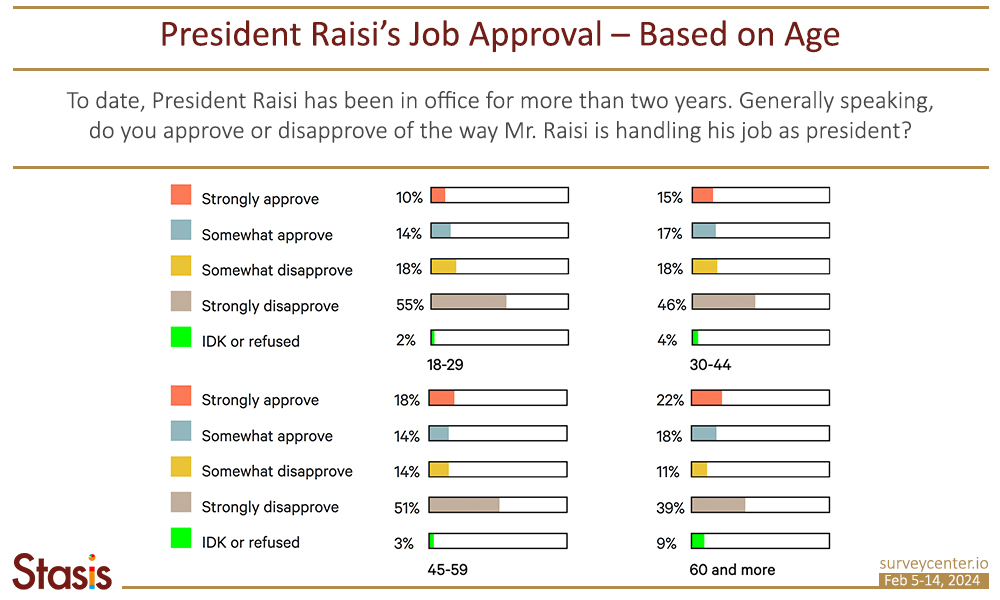
Iranians also disapprove of the way the current parliament is handling its job. Just 30% of Iranians approve of its performance as opposed to 61% who disapprove.
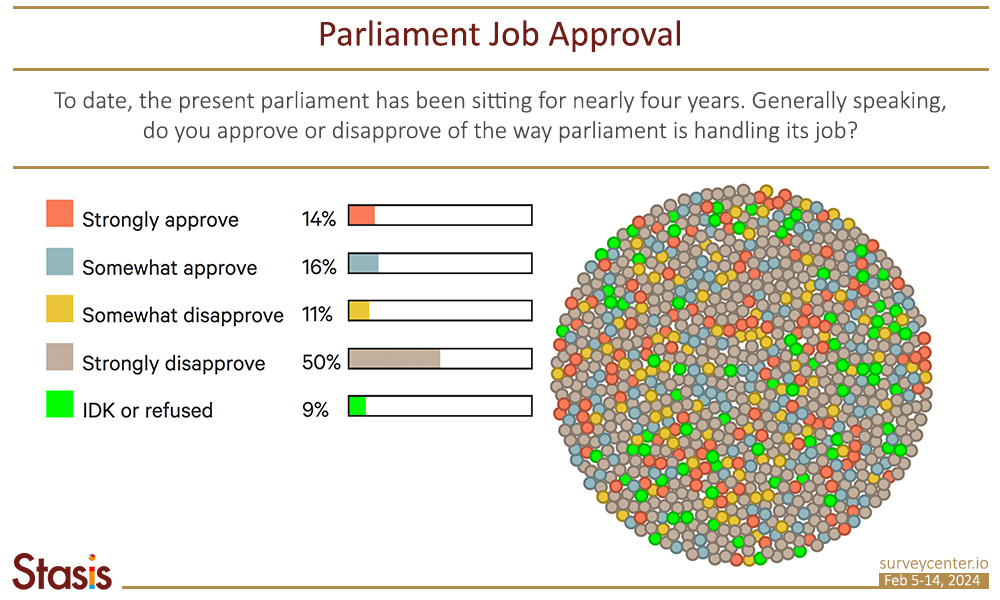
Raisi beats Zarif in a hypothetical presidential election, 30% to 16%
President Raisi beats former Foreign Minister Zarif in a hypothetical presidential election, by a shrinking margin. If they were to face off today, 30% of Iranians would choose Mr. Raisi against 16% for Mr. Zarif. The difference between these two potential candidates is less drastic among young Iranians than in the general population: 24% of respondents aged 18-29 would support Mr. Raisi while 20% prefer Mr. Zarif.
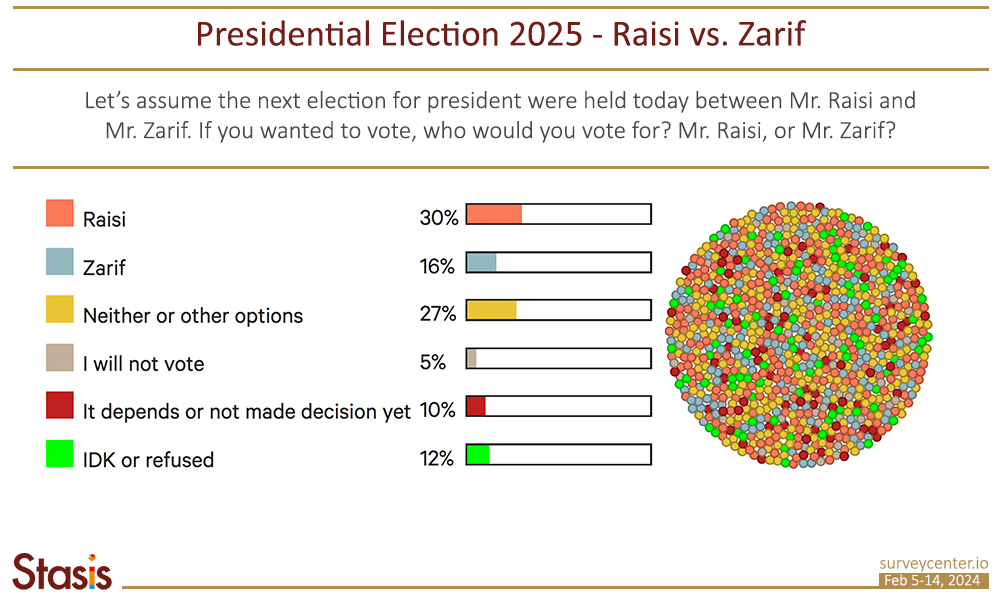
Although there is a double-digit gap in favor of Mr. Raisi, the numbers are better for Mr. Zarif compared with the last time Stasis polled Iranian citizens on this question. In May 2021, approximately one month before the last presidential election, 65% respondents selected Mr. Raisi and just 11% chose Mr. Zarif.
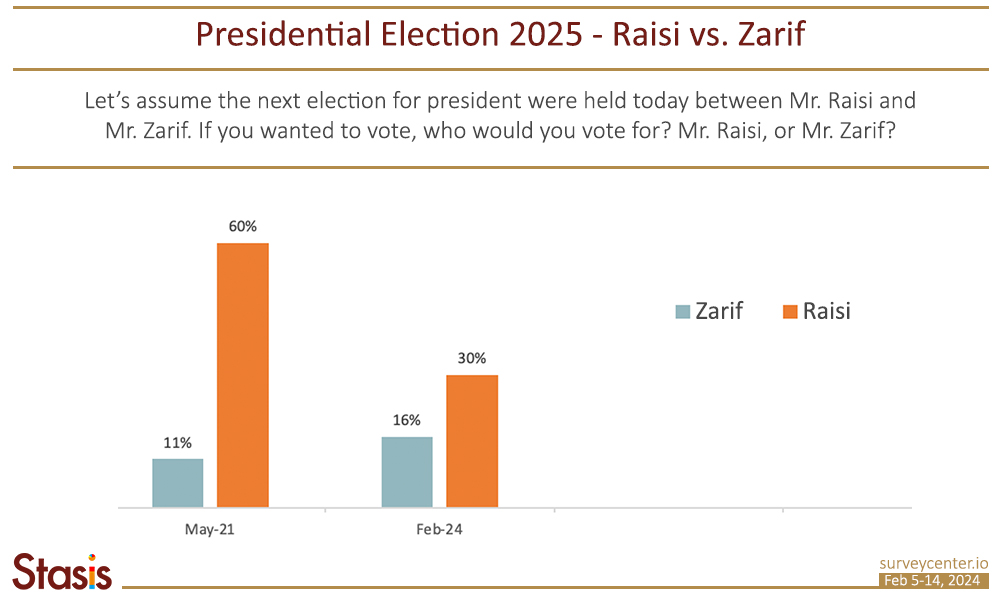
Iranian youth have serious concerns about their futures
In this survey, most respondents said that they are pessimistic about the future prosperity of the nation’s youth (76%), and most Iranians believe that young people would rather emigrate than stay in the country (68%). Respondents aged 18 to 29 are even more concerned about the prospects for future prosperity among Iranian youth (82%) and more likely to believe young people want to emigrate rather than stay in Iran (77%).
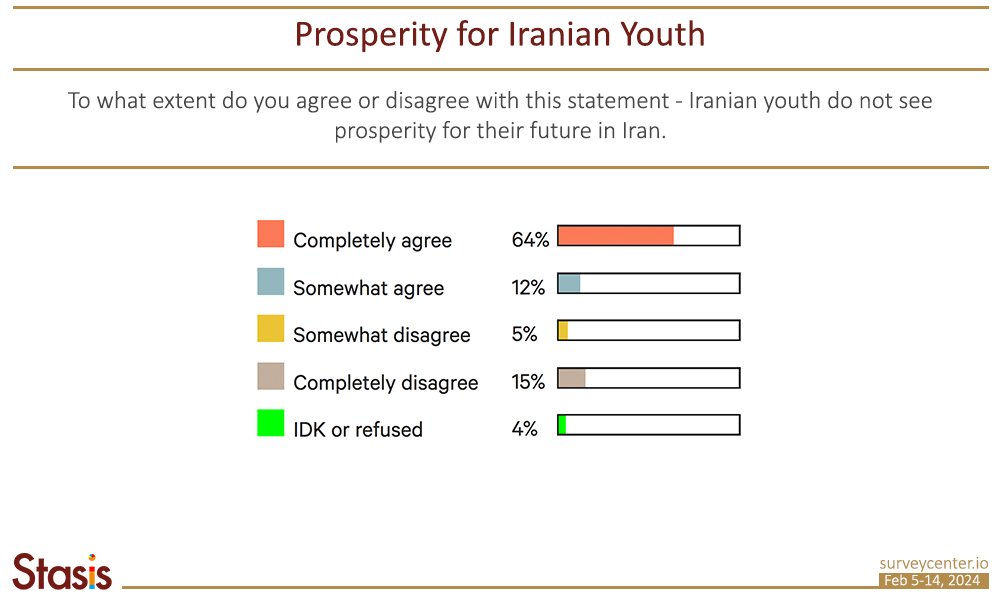
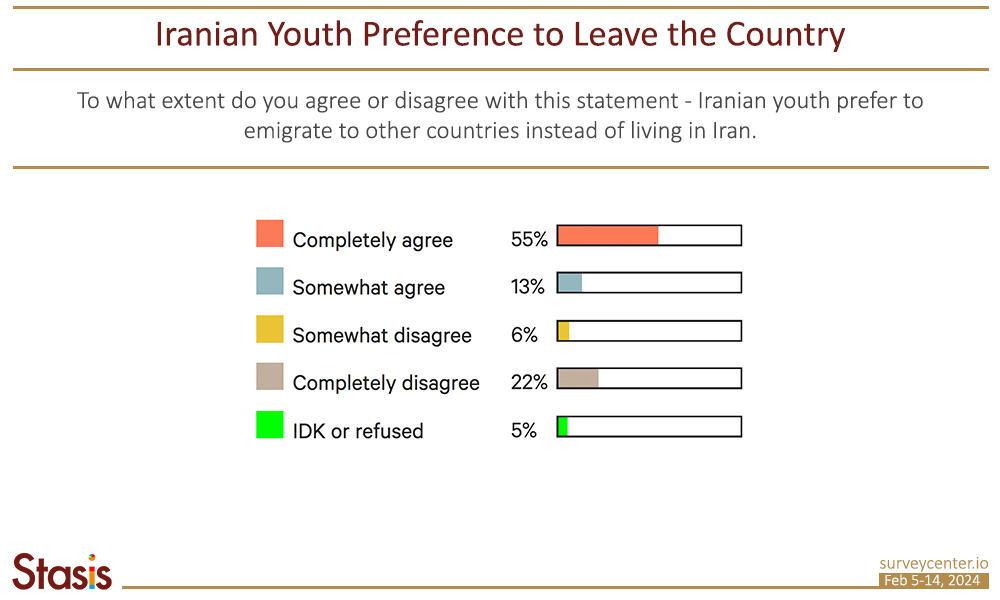
Arash Ghafouri is the CEO of Stasis Consulting.
Methodology and notes
Telephone interviews were conducted by native Farsi speakers during local daytime hours between Feb. 5 and Feb. 14, 2024, with 1,264 respondents aged 18 and older living in Iran. The proportional two-stage sample includes respondents from every province. Provinces have been sampled based on their population. Results are weighted by gender, age, location (urban vs. rural areas), and adjusted for Tehran’s province. Based on the sample, there is a 95% confidence that the margin of sampling error is within ±2.76 percentage points. Charts included above may not equal 100% due to rounding.
For more information on the poll or to explore an interactive visualization of the results, please see this link. This interactive platform provides a visualized breakdown of results by gender, age group, location, and education for each question in the survey, along with more detailed information on respondents.
Photo by Morteza Nikoubazl/NurPhoto via Getty Images
The Middle East Institute (MEI) is an independent, non-partisan, non-for-profit, educational organization. It does not engage in advocacy and its scholars’ opinions are their own. MEI welcomes financial donations, but retains sole editorial control over its work and its publications reflect only the authors’ views. For a listing of MEI donors, please click here.













